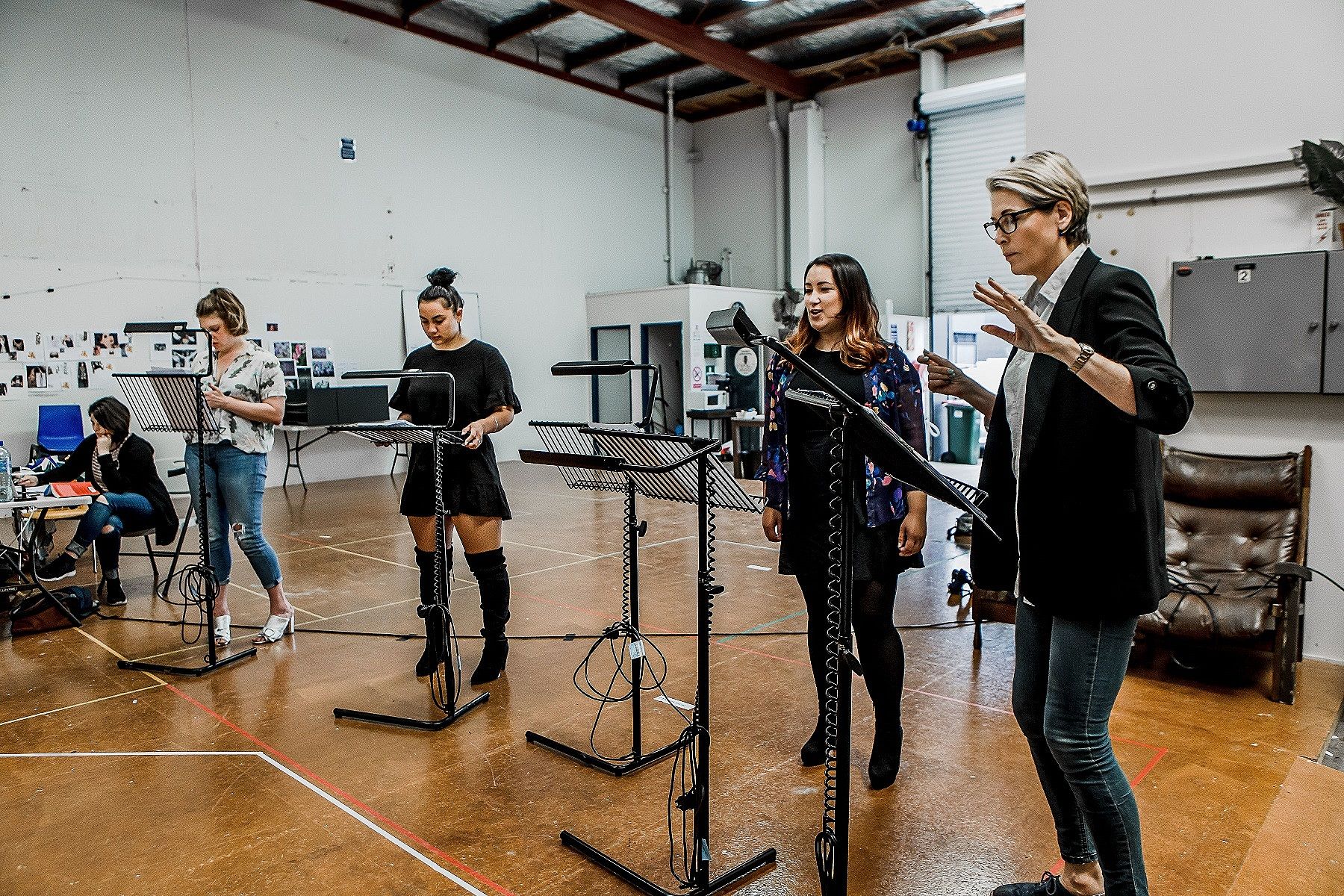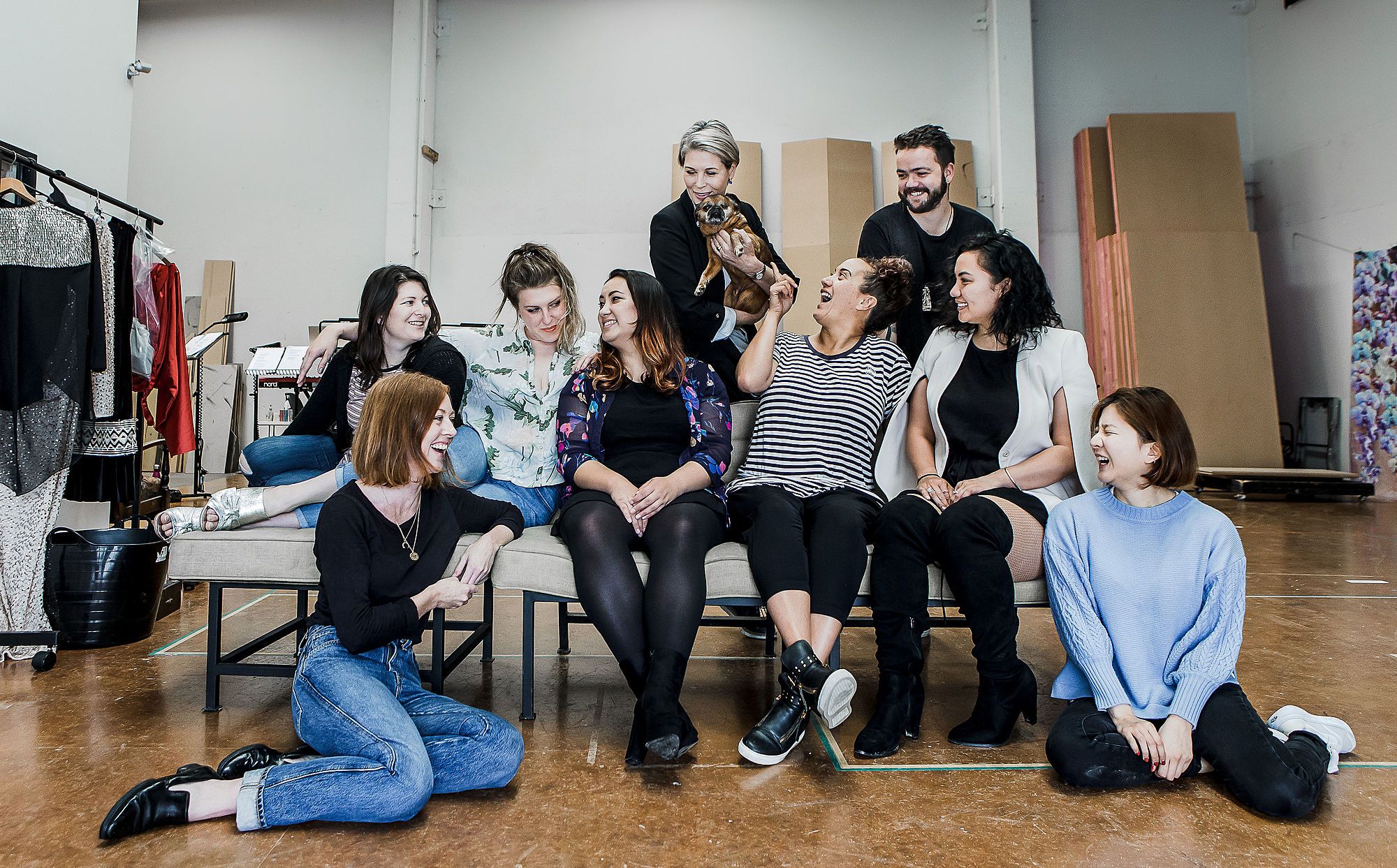Disco Dictator: Pop and Pain in Here Lies Love
Lucy Beeler reflects on the music and messages of Here Lies Love, David Byrne and Fatboy Slim's funky pop album about former First Lady of the Philippines Imelda Marcos, and looks at how Silo Theatre aims to bring it all to life.
Here Lies Love is a funky, glossy pop album about former First Lady of the Philippines Imelda Marcos, produced by American new wave legend David Byrne and British house king Norman 'Fatboy Slim' Cook. It's got some things to say about power and wealth and how intoxicating they can be - but it's also saying some things, however unintentional, about how other cultures are interpreted by a Western lens. Lucy Beeler reflects on the album, and looks at how Silo Theatre aims to bring it all to life.
A national icon, a disco diva, a dictator’s wife. Glamourous but corrupt. The personification of modernisation and of exorbitant wealth. Imelda Marcos, the former First Lady of the Philippines, has been given a host of labels. Whether they ring true to you or not depends on where you live; how much money you have; what cultures you grew up in; what you believe about politics and history.
In the West, her controversial public persona has been the subject of fascination for decades. In a 1988 Saturday Night Live skit, comedian Nora Gunn played a zeitgeisty, tone-deaf impersonation of Marcos in exile from the Philippines, talking about her love of partying and extravagant lifestyle. Fourteen years later, news outlets like The Guardian and Business Insider were covering the curious story of how Marcos’ 1000-pair+ shoe collection was severely damaged by a slew of “termites, storms, and neglect” while on display at the Marikina Museum.
The potency of Marcos’ intrigue captivated musicians David Byrne and Norman Cook: in 2010, the duo released Here Lies Love, a 22-song Les Mis-styled concept album based on her life as told through her eyes. On one hand, the album is a vibrant and eclectic collection of songs, featuring an impressive array of contributing vocalists, inspired by Marcos’ love for all things disco. On the other hand, it is conceptually driven by what Byrne described in a THNKR interview as a connection between the euphoria felt on the dance floor and the euphoria felt by a person in power.
Byrne, who grew up on the American East Coast, founded the avant art-pop band Talking Heads in 1975. The band enjoyed decades of success with hits like ‘Psycho Killer’ and ‘This Must Be The Place (Naive Melody).’ They were inducted into the Rock and Roll Hall of Fame in 2002 and their legacy continues on the airwaves today. Byrne has also had an influential, successful career as a solo artist, working with artists like Brian Eno and St. Vincent, and lending his compositional talents to films like Bertolucci’s The Last Emperor and dance productions like Tharp’s The Catherine Wheel.
On the other side of the Atlantic, the UK-based Cook first developed his sound with the 80s indie new wave band The Housemartins, who hit the top of the UK charts with songs like ‘Happy Hour.’ After the band dissolved, Cook pursued projects like acid jazz outfit Freak Power and house music duo Pizzaman before becoming DJ Fatboy Slim in 1996. Under that moniker, Cook produced hits like ‘The Rockafeller Skank’ and ‘Weapon of Choice,’ which earned him six awards at the 2001 MTV Music Video Awards.
Some might think the two an unlikely sonic pairing, but analysing their respective signature styles conveys how they collaboratively translated the concept to sound. Byrne is an incredible writer of lyrics that are blasé yet poignant. In ‘Naive Melody,’ for example, Byrne’s straightforward words somehow still read as romantic sentiment:
We drift in and out
Oh! Sing into my mouth
Out of all those kinds of people
You got a face with a view
Byrne also has a penchant for intricately weaving together synthesised, real, and non-Western sounds in his songs. There’s a nostalgic unfamiliarity to his work; catchy pop songs with an edge.
Similarly, Cook is known for using the Akai S-950 midi digital sampler to record, edit and loop sound samples from sources like old vinyl and film. Cook uses these samples to create a diverse range of moods, from a kind of laidback, backyard BBQ dance groove (‘Praise You’) to momentum-building bangers worthy of a car-chase scene (‘Right Here, Right Now’). The duo’s tastes and skill sets complement each other on the album. Cook’s sense of groove cradles Byrne’s clever arrangements, as in ‘Solano Avenue’ where a funky, Quincy Jones-esque electric guitar sampled loop meets an artfully arranged string/brass section and the powerful wails of Nicole Atkins and her backing singers. It’s dramatic and over the top like a 70s action flick, but the mood propels the part of the story where Marcos’ estranged childhood friend Estrella confronts her in her last days of power. It’s well designed, atmospheric, an orchestrated narrative.
Each song recounts specific chapters of Imelda Marcos’ life, up until the point she and her husband, President Ferdinand Marcos, were exiled as the result of a revolution fuelled by an economic crisis and the assassination of opposition leader Benigno Aquino Jr. In the eponymous first track, singer Florence Welch of Florence and the Machine serenades us like a Disney princess, singing about Marcos’ early days as a “simple country girl who had a dream,” while Latin drums and breakbeats bring it out of Disney and into adult contemporary pop. In the 90s-esque ‘Eleven Days,’ a sultry Cyndi Lauper remembers the eleven-day-long courtship between Imelda meeting and marrying Ferdinand. In the groove anthem ‘Dancing Together’ funk legend Sharon Jones belts out details of Marcos’ luxurious life partying with corporate royalty: “I met a Whitney, Rockefeller, and Brown”/ “Christina Onassis and the Queen of Spain.”
Here Lies Love is a cerebral maze of political commentary disguised as 90 minutes of unadulterated dance music. Shiny rhythms lull the listener into a false sense of familiarity with each songs’ pop structure. But the vibrancy of the songs juxtaposed with the morbidity of the narrative creates an underlying feeling of built-up unease – we forget who the songs were about, and then remember again. Here Lies Love effectively challenges us to contemplate how easily we overlook unchecked power and immeasurable wealth. It’s clever, walking a fine line between salient commentary and flippancy. But does this absurdism undermine the lived experience of the Filipino people who suffered under the Marcos regime by glossing over the hard-to-swallow aspects of that history? How do Byrne and Cook interpret the Filipino experience of a political period marked by civil unrest and economic disparity?
These are difficult questions, and their difficulty is compounded in the album’s stage musical adaptation. The stage adaptation of Here Lies Love premiered off Broadway at New York's Public Theatre in 2013, and has since been staged in London and Seattle. During those seasons, the production was criticised for oversimplifying the stark reality of martial-law-governed Philippines at the time. In The Stranger, Sara Porkalob described the Seattle production as, “re-appropriated historic material that... commercialize[s] and reconstruct[s] US and Philippine history for marketable, danceable consumption.” In a Seattle Weekly review, Becs Richards rhetorically asked, “What would Here Lies Love look like if it had been written by Filipinos who had been a part of or connected to the revolution?”
You aren’t just invited to dance in your seats. You’re invited to draw your own conclusions on the album, the concept, the story of a woman who became synonymous with power, wealth and political disruption.
These past live productions bear no resemblance to what Roberts and Kelly endeavour to achieve here: an interpretation centred on the artists who perform the songs, rather than a musical asking the artists to embody a single character. “I'm always inspired by the artists I'm working with at the time,” Roberts says. “In this case,” she says, “we have five really distinct women with different performance and musical personalities.” Those women are boss lady of theatre and television Jennifer Ward-Lealand, pop-genre-blending songstress Ria Hall, musical-theatre queen Colleen Davis, triple-threat actor/singer/dancer Sarah Nessia, and badass producer and singer Villette. In this gig, they’re supported by an expert lineup of performing musicians including guitarist Marika Hodgson (who’s previously played with Hollie Smith and Estere), electronic artist Paddy Free of Salmonella Dub, and Latin percussionist Antonio Karam. “I'm interested in elevating who they already are,” Roberts says, “and creating a world that celebrates these five amazing women.”
“We're taking the original songs, which as a collection explore the intoxicating, almost narcotic effect of power and influence, and presenting them with some of our premier local music and stage talent,” Kelly says. “The audience will be left less with narrative than with impression or prevailing mood – that of self-made destiny, power, and wealth.” In the album, this narcotic effect Kelly refers to is a slow-burning high in both form and composition. The album’s steady pace echoes its mood, where those shiny rhythms desensitise you to the effect of power and wealth.
In focusing on this prevailing mood, this sense of the intoxicating quality of extreme power and extreme wealth, Roberts and Kelly are aiming to do what past enactments have failed at: interpreting Byrne and Cook’s music for a live audience without further obscuring the story of Imelda Marcos in eurocentric re-appropriation. In performing a live show of the album rather than the stage musical, Kelly says, the performers are not faced with having to cement a character like Imelda. Instead, the focus is on interpreting the songs within Byrne’s original notion of the shared euphoria between the person on the dance floor and the person drunk on power.
“[We’re] applying a theatrical frame and process to a gig,” Roberts says. “We break down and interrogate the emotional arcs within a song, within an act and within the journey of the show as a whole.” The artists’ talents drive Here Lies Love, inviting the audience to, as Roberts puts it, “absorb the emotional arc through the music.”
You aren’t just invited to dance in your seats. You’re invited to draw your own conclusions on the album, the concept, the story of a woman who became synonymous with power, wealth and political disruption. The story of a woman who helped tear a nation apart while a disco ball spun overhead.
Here Lies Love runs from November 22 to December 8 at Q Theatre Rangatira. Tickets available here.
This piece is presented as part of a partnership with Silo Theatre and appears in the show programme. Silo cover the costs of paying our writers while we retain all editorial control.
Rehearsal images: .





